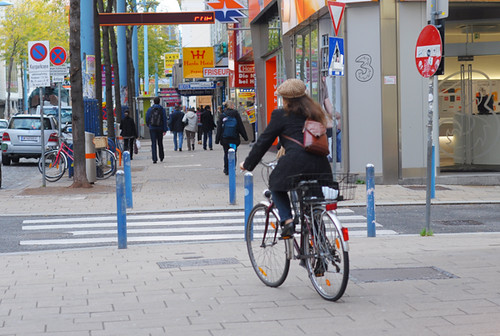 I was speaking with an Austrian friend who rides a bike and works in advertising, and she raised the topic of marketing in relation to "bicycle culture." She finds it interesting ("and very American") that so many bicycle enthusiasts today employ a "strength of character" narrative, instead of an "increased utility" narrative when discussing their interest in cycling or attempting to promote it to others. This way of relating to cycling has never been popular in Europe, but has now become more so - due to an American cultural influence, she believes.
I was speaking with an Austrian friend who rides a bike and works in advertising, and she raised the topic of marketing in relation to "bicycle culture." She finds it interesting ("and very American") that so many bicycle enthusiasts today employ a "strength of character" narrative, instead of an "increased utility" narrative when discussing their interest in cycling or attempting to promote it to others. This way of relating to cycling has never been popular in Europe, but has now become more so - due to an American cultural influence, she believes.I understand what she is talking about.One method of making a given behaviour seem appealing to people,is to present is as something that will facilitate and improve their lives. But an alternative method is the exact opposite: to portray the behaviour as difficult and often inconvenient, yet indicative of strength of character. The person engages in this behaviour despite all sorts of obstacles, and doing so makes them a special person - passionate, resourceful, dedicated - which, for some, is an appealing self-image.
With cycling blogs, I find that these narratives are often used in parallel, though some will stress one over the other. For instance, themes such as"Once I started cycling, I realised it was actually easier and faster than driving," vs "I arrived soaked, exhausted and late, but proud" can co-exist in a blog despite their contradicting one another (how can it be "easier and faster" if we admit to arriving to work late and soggy?).
I am not sure what I think of my friend's suggestion that the "overcoming adversity" take on cycling is an inherently American one.In my experience, it is true that a European will more readily admit to doing something "because it's convenient for me," whereas an American will be more likely to ascribe greater meaning to the same act. But national character is tricky to discuss based on anecdotal accounts. To me, the more interesting thing is the way these narratives - "cycling is easy" vs "cycling is difficult but makes you a special person," can exist in parallel. I wonder how many new readers and would-be cyclists notice the contradiction.
No comments:
Post a Comment